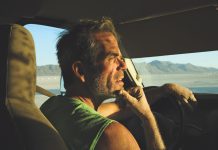Think It Over

As I reached the Peppertree Lane entrance, the teenage girls standing nearby were regrouping. “Oh my gosh! This man across the street yelled at me, telling me I was filled with sin and I’d be hearing baby cries for the rest of my life!” The girls each had their arms wrapped around their individual baby-carriers that held their newborns.
The girl who had been verbally assaulted was trying to comfort her crying infant. She looked like she would like to cry herself.
This was the start of their 72-hour participation in hands-on parenting as an assignment for their health class at Thurston Middle School. The original program is a teen health project that has the trade name “Baby Think It Over.”
The project involves a highly sophisticated, lifelike baby weighing seven pounds that gives teens a chance to try out parenthood and be confronted with some of the challenges and responsibilities.
Both boys and girls get their own infant. Each teenager receives a baby that cries randomly, day and night. It makes sounds that are recorded from real infants crying, cooing, burping, coughing, breathing and feeding. The babies are available in five different ethnic groups. Each baby requires round-the-clock care, and each student is solely responsible for figuring out and taking care of all of his or her infant’s needs.
The baby is anatomically correct and has a lifelike neck movement that requires constant head and neck support. Care includes feeding, burping, diapering, rocking, proper head support and proper positioning.
“What is the worst thing that could happen?” “The baby could die!” they told me. “From abuse or neglect! If you don’t take care right when the baby needs you, it could just shut down and then you fail the class!”
It was Friday afternoon when I ran into the girls, so their weekend was just starting. I asked if anyone can help them, and they held up their wrists and explained that their “bracelet” is non-removable and is what they use to care for their baby. Each time the baby cries they must insert a “care key” into the baby’s computer, located in its back.
An internal computer keeps track of any lack of care and records any abuse, which includes rough handling, dropping or hitting. After an abusive episode, the baby cries for an extended period of time without stopping. The computer records the number of minutes the baby was left unattended after it begins to cry. It shuts down completely if the computer is removed for more than five minutes. After the baby is returned, the computer, which is tamper-proof, is unlocked and the care or any abuse, such as when the head was not properly supported, reveals its data.
The teenagers have to figure out what their baby needs, which may take up to 30 minutes depending on the upset. Is it hungry? Wet? Messy? Colicky? Needs to be burped? Or is it just sleepy and needs comforting?
The program is designed to introduce teens to the realities of caring for a baby full-time in the hope that they will think about the consequences of becoming sexually active.
The U.S. has the highest rates of teenage pregnancy in the western world. Thirty-four percent of young women become pregnant at least once before they reach the age of 20, or about 820,000 a year. Eight in 10 are unintended and 79 percent involve unmarried teens.
Our group of Laguna teens was in Peppertree Lane to get some gelato, to shore them up for the night ahead. At least they had each other’s company. A teenage mother usually gets the opposite experience, becoming isolated and left out by their former friends who are still going to school.
I vaguely remember a less sophisticated program that my daughter Jennica participated in when she was a bit older. She brought home a hollowed out egg that she was required to care for, but the only potential disaster was that it could crack or be dropped and end up like Humpty-Dumpty. When telling her about this baby project, she was pretty doubtful that it would do much to delay sexual activity.
Perhaps developing brainpower that is nurtured through education, guidance, and caring support, may be the best strategy for learning how to make discerning life choices, no matter what our age.
Susan Velasquez is a local author and seminar producer. Her book “Beyond Intellect” is available in our local book stores and at Amazon.com. Learn more at www.susanvelasquez.com or contact her at: (949) 494-7773.




